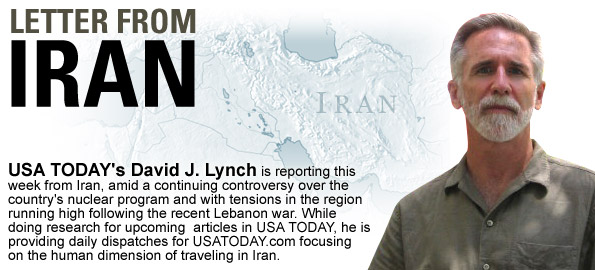Newsmaker
Daily letters from USA Today writer in Iran
(USA Today)
Updated: 2006-08-23 09:54
 |
Large Medium Small |

Day 3: At Behesht-e-Zahra cemetery, a lesson of faith and sacrifice
I found Hassan Mohbi standing in the shade with his wife and two young boys. He'd come to the Behesht-e-Zahra cemetery to visit his best friend, Hussein Mirzai, who died as a 17-year-old soldier in Iran's grinding eight-year war with Iraq.
"What was your friend like?" I asked Hassan. There was a long pause. Finally, he said simply, "He was a very nice guy." You wouldn't think that was faint praise if you'd seen the look on his face.
LATEST NEWS : Iran responds to nuclear options
Behesht-e-Zahra, on the southern outskirts of Tehran, is simply enormous. The dead are cataloged here according to the particular national trauma that struck them down: victims of the Shah's repression in one place; those who died in the revolutionary terror that followed his fall in another; and the numberless casualties of the 1980-88 war in their own sanctuary.
Hassan said he often dreams about his friend, often pulls out faded photographs of him. After I'd interviewed him for a while, Hassan turned the tables. He quizzed me for several minutes about Americans' knowledge of his war and his country. Then he asked me a tough one. Did I agree, he asked, that the best people were those who died in battle?
I told him what I believe, that all countries rightly honor the sacrifice of those who died so the rest of us can enjoy life, but that I found it impossible to look at the graves spreading out in every direction and not feel an overpowering sense of waste and tragedy.
Hassan nodded non-committally. But he didn't say anything about waste and tragedy. Instead, he spoke about the religious faith that propelled his generation to volunteer for a savage war. He became a soldier when he was just 15. As for the danger of a new conflict, Hassan was untroubled. "Maybe the politicians will make a mistake and people will die," he said. "…For us, what's important is to live in a good and proper way. It's not important if we die or are killed."
Only an idiot would generalize about a nation of 68 million people from one conversation. But as I walked away, I couldn't help feeling the lessons of the Iran-Iraq war are worth remembering. The Iranians kept fighting the Iraqis long past the point when it made much military sense. When the war finally ground to a halt in 1988, the front lines weren't a heck of a lot different than they'd been six years earlier.
Hassan doesn't want the war forgotten either. That's why he brought his boys, 16-year-old Abbas and 11-year-old Ali, to his friend's grave. To learn the lessons of faith and sacrifice.